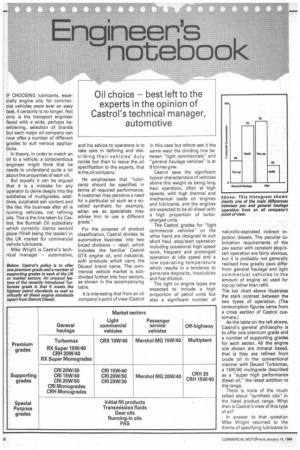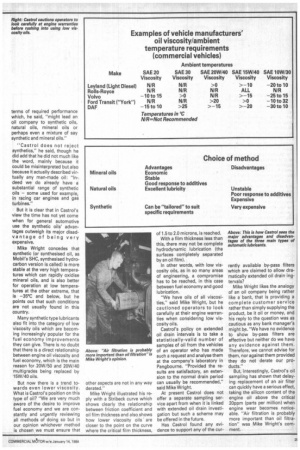Engineer's notebook
Page 30

Page 31

If you've noticed an error in this article please click here to report it so we can fix it.
Oil choice — best left to the experts in the opinion of Castrol's technical manager, automotive
IF CHOOSING lubricants, especially engine oils, for commercial vehicles were ever an easy task, it certainly is no longer. Not only is the transport engineer faced with a wide, perhaps bewildering, selection of brands but each major oil company can now offer a number of different grades to suit various applications.
In theory, in order to match an oil to a vehicle, a conscientious engineer might think that he needs to understand quite a lot about the properties of each oil.
But equally it can be argued that it is a mistake for any operator to delve deeply into the subtleties of multigrades, additives, sulphated ash content and the like. His business after all is running vehicles, not refining oils. This is the line taken by Castrol, the Burmah Oil subsidiary which currently claims second place {Shell being the leader) in the UK market for commercial vehicle lubricants.
Mike Wright is Castrol's technical manager — automotive, and his advice to operators is to take care in defining and describing their vehicles' duty cycles but then to leave the oil specification to the experts, that is the oil company.
He emphasises that "lubricants should be specified in terms of required performance. A customer may perceive a need for a particular oil such as a socalled synthetic for example, when we as specialists may advise him to use a different grade."
For the purpose of product classification, Castrol divides its automotive business into two broad divisions — retail, which includes the familiar Castrol GTX engine oil, and industrial, with products which carry the Deusol brand name. The commercial vehicle market is subdivided further into four sectors, as shown in the accompanying table.
!Lis interesting that from an oil company's point of view (Castrol in this case but others see it the same way) the dividing line between "light commercials" and "general haulage vehicles" is at 8 tonnes gvw.
Castrol sees the significant typical characteristics of vehicles above this weight as being long haul operation, often at high speeds, with high thermal and mechanical loads on engines and lubricants, and the engines are expected to be all diesel with a high proportion of turbocharged units.
The Castrol grades for "light commercial vehicles" on the other hand are designed to suit short haul, stop/start operation including occasional high speed work, frequent and prolonged operation at idle speed and a low operating temperature which results in a tendency to generate deposits, insolubles and fuel dilution.
The light cv engine types are expected to include a high proportion of petrol units but also a significant number of naturally-aspirated indirect injection diesels. The peculiar lubrication requirements of the psv sector with constant stop/start operation are fairly obvious, but it is probably not generally realised how greatly psvs differ from general haulage and light commercial vehicles in the amount of engine oil used for top up rather than refill.
The bar chart above illustrates the stark contrast between the two types of operation. (The consumption figures came from a cross section of Castrol customers.) As the table on the left shows, Castrol's general philosophy is to offer one premium grade and a number of supporting grades for each sector. All the engine oils shown are mineral based, that is they are refined from crude oil in the conventional manner with Deusol Turbomax, a 15W/40 multigrade described as a "super high performance diesel oil," the latest addition to the range.
There is none of the much talked about "synthetic oils" in the listed product range. What then is Castrol's view of this type of oil?
In answer to that question Mike Wright returned to the theme of specifying lubricants in terms of required performance which, he said, "might lead an oil company to synthetic oils, natural oils, mineral oils or perhaps even a mixture of say synthetic and mineral oils."
"Castrol does not reject synthetics," he said, though he did add that he did not much like the word, mainly because it could be misinterpreted but also because it actually described virtually any man-made oil: "Indeed we do already have a substantial range of synthetic oils — some used for example, in racing car engines and gas turbines."
But it is clear that in Castrol's view the time has not yet come when for general automotive use the synthetic oils' advantages outweigh its major disadvantage of being very expensive.
Mike Wright concedes that synthetic (or synthesised oil, as Mobil's SHC, synthesised hydrocarbon version is called) is more stable at the very high temperatures which can rapidly oxidise mineral oils, and is also better for operation at low temperatures at the other extreme, that is —35°C and below, but he points out that such conditions are not usually found in this country.
Many synthetic type lubricants also fit into the category of low viscosity oils which are becoming increasingly popular for the fuel economy improvements they can give. There is no doubt that there is a direct relationship between engine oil viscosity and fuel economy, which is the main reason for 20W/50 and 20W/40 muitigrades being replaced by 15W/40 oils.
But now there is a trend towards even lower viscosity. What is Castrol's position on this type of oil? "We are very much aware of the desire to improve fuel economy and we are constantly and urgently reviewing all methods of doing so but in our opinion whichever method is chosen we must ensure that other aspects are not in any way derated."
Mike Wright illustrated his re ply with a Stribeck curve which shows clearly the relationship between friction coefficient and oil film thickness and also. shows how lower viscosity oils ' are closer to the point on the curve where the critical film thickness, of 1.5 to 2.0 microns, is reached.
With a film thickness less than this, there may not be complete hydrodynamic lubrication (the surfaces completely separated by an oil film).
In other words, with low viscosity oils, as in so many areas of engineering, a compromise has to be reached, in this case between fuel economy and good lubrication.
"We have oils of all viscosities," said Mike Wright, but he cautioned operators to look carefully at their engine warranties when considering low viscosity oils.
Castrol's policy on extended oil drain intervals is to take a statistically-valid number of samples of oil from the vehicles of an operator who has made such a request and analyse them at the company's laboratory in Pangbourne. "Provided the results are satisfactory, an extension to the normal drain period can usually be recommended," said Mike Wright.
At present Castrol does riot offer a separate sampling service apart from when it is linked with extended oil drain investigation but such a scheme may be offered in the future.
Has Castrol found any evidence to support any of the cur rently available by-pass filters which are claimed to allow dra matically extended oil drain ing tervals?
Mike Wright likes the analogy of an oil company being rather like a bank, that is providing a complete customer service rather than simply supplying the product, be it oil or money, and his reply to the question was as cautious as any bank manager's might bp. "We have no evidence to show by-pass filters are effective but neither do we have any evidence against them. Therefore, we cannot advise for them, nor against them provided they do not derate our pro ducts."
But, interestingly, Castrol's oil sampling has shown that delaying replacement of an air filter can quickly have a serious effect, taking the silicon content of the engine oil above the critical 20ppm (parts per million) when engine wear becomes noticeable. "Air filtration is probably more important than oil filtration" was Mike Wright's cornme nt.








































































